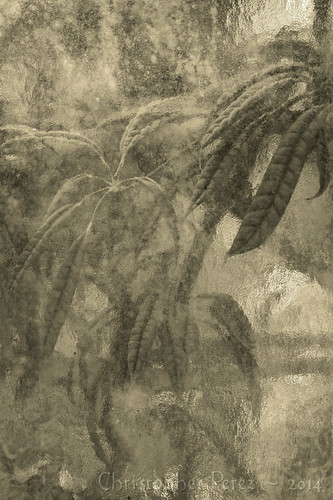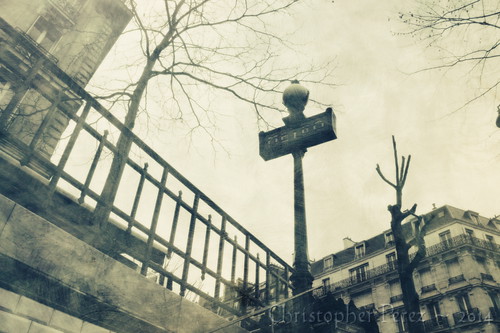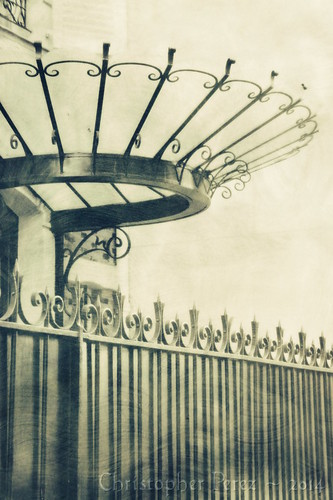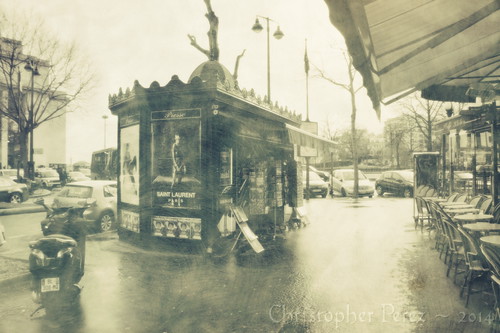People we know were coming to France.
It was time to book our train and hotel, even as (for us) the TGV employees had gone out on strike and (for our friends) the US has raised it's terrorism threat level to chartreuse (or some related ugly color) and were being Extra Careful performing their searches of Everyone and Everything.

We were off to Lyon!
Our first French language classes back in the States were at the Alliance Francaise. We met M. Guillaume (not his real name, we have to protect the innocent as well as the guilty, right?) and his wife there. They were to be in Spain for a work related conference and were renting a burro to explore southern France for a week or two after work.
This was our first time in Lyon and had no idea what to expect. So we fired up the DVD player and enabled it's connection to the "internets" to see a few BBC broadcast documentaries on the third largest town in France. With a few episodes of "Barging Through France" and a couple other things under our belt, we were as prepared as we ever would be to take our invasion south. There are things we know. Things we don't know. And then there are the things we don't know that we don't know. Or so said some brilliant military strategist.

The first thing I noticed is how much like southern California it felt. Lyon is warm, sultry, edging on dirty, and everything moves at a slower pace than points north (ie: Paris or Seattle - it didn't matter, the effect is the same).
One of the things we learned from Richard Goodwin is that someone named Paul Bocuse is God in those parts of the world. We hear he had more than a little to do with something called Nouvelle Cuisine. We also learned from RG that Lyon is lousy with les petits endoits called bouchon. The food is by many accounts superior to what Parisian waiters slap down on a restaurant table.
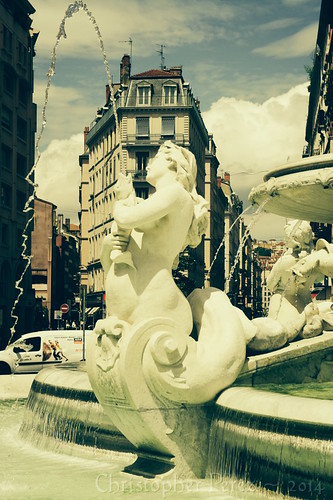
In similar time I've been in the midst of a very serious reading of the Asterix series of graphic novels. Wherein I learned rather important things. Such as the historic importance of sanglier. As was uttered in the movie Babe, pork is a nice sweet meat. If there is anything on the planet tastier than European porc (wild or human raised), I've yet to find it.
Shortly after checking into our hotel room Guillaume and his wife checked into theirs. It was good to see them after two years. They had been one of our first visitors back when we lived for a short time near the Trocadero. Their sons are well informed, well schooled, and talented in science and business. We shared a bit of wine, food, and lots of conversation then. This time without their boys it was just the four of us.
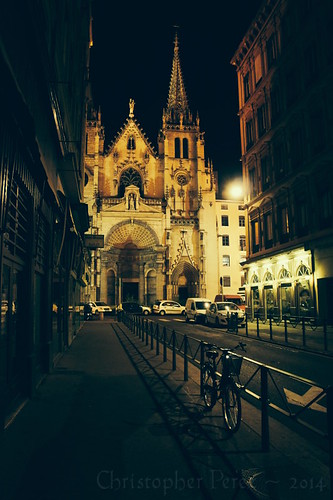
Wanting to avoid what we call "fussy food", we called down to the front desk to ask for reservations for a bouchon just around the corner. Looking at the definition of bouchon one sees it's primary meanings include cork, stopper, cap, and fisherman's bobber. Given these possibilities of translations we weren't quite sure what to expect.
Daniel et Denise is a friendly, welcoming place where the servers seem to enjoy practicing their English. The food was decidedly not "fussy". In fact, it's down right "homey." I'm sure that had my mother been French instead of Austro-Hungarian that this is the kind of food she would have served. Rich. Simple. Direct. Wonderful to eat. No knife is needed to get at the Good Parts of an amazing lamb roast. In fact, no knifes are given. Simply dechirer, dip in the sauce, and eat. Even better when floated down-stream with a bottle or two of Cotes de Rhone.
Burp. Bouchon, eh? What were those translations again?
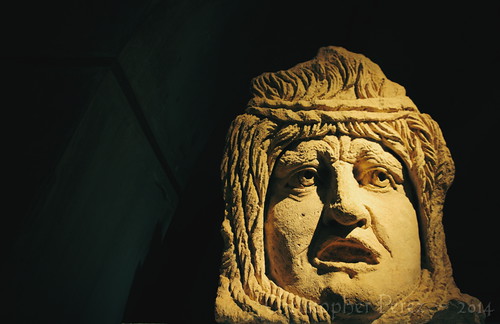
When the morning sun had taken over the last nights sky we headed up the hill to see what could be seen. My wife must be part cat as she likes high places to watch things from. What a view it was. It reminded us of the kinds of views you have in Florence. Red tile roofs and old building as far as the old city limits allowed. With modern buildings beyond.
We spend a nice day visiting a Roman site that was recently uncovered. We wandered an amazing basilica that's plopped squarely on top of the hill. We negociated a steep walk down the hill, across the old town, and back to our hotel on the other side of the two rivers. We were hungry.
Our Front Desk had to know we'd bug them a second time. S'il vous plait, could you call for reservations for four at Les Federations, say, oh, around 20h00? Merci. This was to be our second bouchon in two nights.
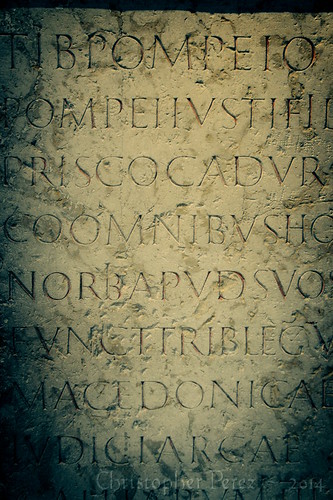
Les Federations is smaller, tighter, and seedier than D&D's. You need to ask questions about what's really on the menu. Otherwise you end up with porc entrails stuffed into a sausage. Avoiding that might be a trick. Make sure your ears are well tuned to the word andoillette. Other than that, the boudon noir is amazing, chicken in vinaigre nice, and the porc cheeks succulent. Yes, rivers of Cotes de Rhone help float everything nicely down the gullet.
Ack! I failed to mention all the Meaty, Corchony, Cheesy, Lardy Goodness that are put on the table to "assist" the flavors of the event. Ask if you don't know what something is. Even then you might not know, but you'll have words to look up later, if nothing else. This will come in hand particularly during the Cheese Course. Or just look up tue mouche before you dive in. You'll be better prepared heading into battle.
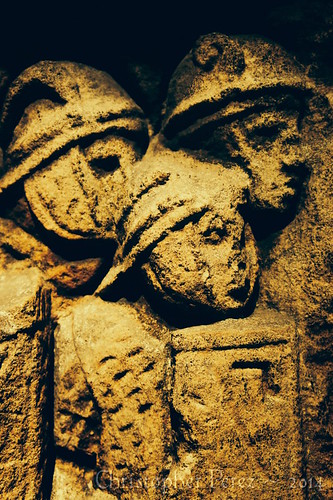
Burp. Burp. Ah, bouchon... yes... something's coming to mind... swirling thoughts... stopper... cap... um...
M. Guillaume had driven us into the old town for dinner and was amazed to find a "great parking spot." After a stroll through the streets, spying the scene of a waxing moon over the hill-top basilica, and standing slack-jawed at a well-lit church just around the corner, we came to learn the true nature of our "great parking spot." Oh, the Lyonaise are a patient lot. They'd have to be. Without knowing it, our burro was parked right across the entry to a small parking lot. There was no getting in or out of the lot. We'd very successfully bouchon'd those cars into place.
We all agreed that M. Guillaume just spent his "Get Out Of Jail Free" card.
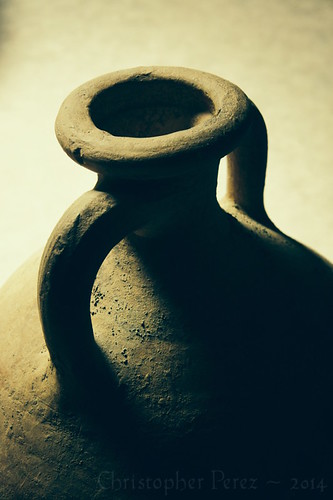
Our Last Supper found us returned to Daniel et Denise. It was close and easy. We knew there were more places to visit, but we were tired and all on the verge of coming down with something related to Overseas Travel Whilst Eating Rich Food Like Momma SHOULD Have Made. We'd go lighter on the fare this time around at D&Ds. So we called a third time down to the front desk. Patient folk those Lyonaise are.
With Asterix-like pride I considered my Current Position. So far it had been Lamb, Porc (during a lunch I fail to chronicle here) and Sanglier. Why not round out the Tour with a wee-bit-o-Porcelet? Why not, indeed. Amazing stuff, properly prepared porcelet. Floated down stream by a small creek of Cote de Rhone, of course. Bouchon'ing the evening off this time with a Chartreuse digestif.
Burp. Burp. Burp. I am completely and utterly bouchon'd.
There is too too much to try and cover here. Yes. I am thoroughly impressed by what the Romans accomplished. Unlike modern times where America's Army occupies a country for a short time only to leave it a few years later in tatters and ruins, Roman ruins took thousands of years to develop. In the mean time they ruled the Great Unwashed from fabulous buildings, created some amazing art, governed from Books of Law that spanned hundreds of years of successful application, and set the foundations for what now comprises much of Western Civilization. But this is a story for another time. Suffice it to suggest just how impressed I am. Further research is required.
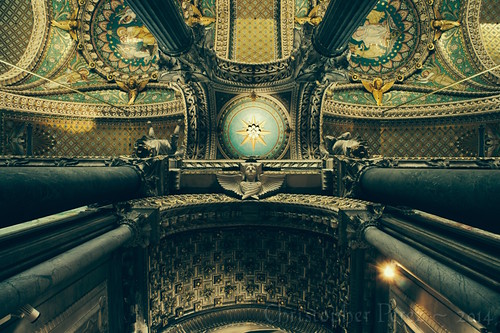
Our Day To Leave Lyon was a bit of a thrash. Jude had left her purse somewhere the night before. It was very likely bouchon'd between seat cushions or bouchon'd into a dark corner somewhere at the bouchon. A call to the Front Deck confirmed they had un-bouchon'd her purse in their lobby seats the night before. Promptly delivered, peace returned to our Fine Empire. Whew! That'd been a close call.
Jude had just spent her "Get Out Of Jail Free" card.
It was time to un-bouchon ourselves out of Lyon. M. Guillaume and his wife pointed the burro back to Spain. We took the T1 tramway to Part-Dieux, and jumped our 5 minutes en retard, mon dieu!!! TGV back to Paris.
What an adventure this had been. So... where next...? Any suggestions... anyone...?
It was time to book our train and hotel, even as (for us) the TGV employees had gone out on strike and (for our friends) the US has raised it's terrorism threat level to chartreuse (or some related ugly color) and were being Extra Careful performing their searches of Everyone and Everything.

We were off to Lyon!
Our first French language classes back in the States were at the Alliance Francaise. We met M. Guillaume (not his real name, we have to protect the innocent as well as the guilty, right?) and his wife there. They were to be in Spain for a work related conference and were renting a burro to explore southern France for a week or two after work.
This was our first time in Lyon and had no idea what to expect. So we fired up the DVD player and enabled it's connection to the "internets" to see a few BBC broadcast documentaries on the third largest town in France. With a few episodes of "Barging Through France" and a couple other things under our belt, we were as prepared as we ever would be to take our invasion south. There are things we know. Things we don't know. And then there are the things we don't know that we don't know. Or so said some brilliant military strategist.

The first thing I noticed is how much like southern California it felt. Lyon is warm, sultry, edging on dirty, and everything moves at a slower pace than points north (ie: Paris or Seattle - it didn't matter, the effect is the same).
One of the things we learned from Richard Goodwin is that someone named Paul Bocuse is God in those parts of the world. We hear he had more than a little to do with something called Nouvelle Cuisine. We also learned from RG that Lyon is lousy with les petits endoits called bouchon. The food is by many accounts superior to what Parisian waiters slap down on a restaurant table.

In similar time I've been in the midst of a very serious reading of the Asterix series of graphic novels. Wherein I learned rather important things. Such as the historic importance of sanglier. As was uttered in the movie Babe, pork is a nice sweet meat. If there is anything on the planet tastier than European porc (wild or human raised), I've yet to find it.
Shortly after checking into our hotel room Guillaume and his wife checked into theirs. It was good to see them after two years. They had been one of our first visitors back when we lived for a short time near the Trocadero. Their sons are well informed, well schooled, and talented in science and business. We shared a bit of wine, food, and lots of conversation then. This time without their boys it was just the four of us.

Wanting to avoid what we call "fussy food", we called down to the front desk to ask for reservations for a bouchon just around the corner. Looking at the definition of bouchon one sees it's primary meanings include cork, stopper, cap, and fisherman's bobber. Given these possibilities of translations we weren't quite sure what to expect.
Daniel et Denise is a friendly, welcoming place where the servers seem to enjoy practicing their English. The food was decidedly not "fussy". In fact, it's down right "homey." I'm sure that had my mother been French instead of Austro-Hungarian that this is the kind of food she would have served. Rich. Simple. Direct. Wonderful to eat. No knife is needed to get at the Good Parts of an amazing lamb roast. In fact, no knifes are given. Simply dechirer, dip in the sauce, and eat. Even better when floated down-stream with a bottle or two of Cotes de Rhone.
Burp. Bouchon, eh? What were those translations again?

When the morning sun had taken over the last nights sky we headed up the hill to see what could be seen. My wife must be part cat as she likes high places to watch things from. What a view it was. It reminded us of the kinds of views you have in Florence. Red tile roofs and old building as far as the old city limits allowed. With modern buildings beyond.
We spend a nice day visiting a Roman site that was recently uncovered. We wandered an amazing basilica that's plopped squarely on top of the hill. We negociated a steep walk down the hill, across the old town, and back to our hotel on the other side of the two rivers. We were hungry.
Our Front Desk had to know we'd bug them a second time. S'il vous plait, could you call for reservations for four at Les Federations, say, oh, around 20h00? Merci. This was to be our second bouchon in two nights.

Les Federations is smaller, tighter, and seedier than D&D's. You need to ask questions about what's really on the menu. Otherwise you end up with porc entrails stuffed into a sausage. Avoiding that might be a trick. Make sure your ears are well tuned to the word andoillette. Other than that, the boudon noir is amazing, chicken in vinaigre nice, and the porc cheeks succulent. Yes, rivers of Cotes de Rhone help float everything nicely down the gullet.
Ack! I failed to mention all the Meaty, Corchony, Cheesy, Lardy Goodness that are put on the table to "assist" the flavors of the event. Ask if you don't know what something is. Even then you might not know, but you'll have words to look up later, if nothing else. This will come in hand particularly during the Cheese Course. Or just look up tue mouche before you dive in. You'll be better prepared heading into battle.

Burp. Burp. Ah, bouchon... yes... something's coming to mind... swirling thoughts... stopper... cap... um...
M. Guillaume had driven us into the old town for dinner and was amazed to find a "great parking spot." After a stroll through the streets, spying the scene of a waxing moon over the hill-top basilica, and standing slack-jawed at a well-lit church just around the corner, we came to learn the true nature of our "great parking spot." Oh, the Lyonaise are a patient lot. They'd have to be. Without knowing it, our burro was parked right across the entry to a small parking lot. There was no getting in or out of the lot. We'd very successfully bouchon'd those cars into place.
We all agreed that M. Guillaume just spent his "Get Out Of Jail Free" card.

Our Last Supper found us returned to Daniel et Denise. It was close and easy. We knew there were more places to visit, but we were tired and all on the verge of coming down with something related to Overseas Travel Whilst Eating Rich Food Like Momma SHOULD Have Made. We'd go lighter on the fare this time around at D&Ds. So we called a third time down to the front desk. Patient folk those Lyonaise are.
With Asterix-like pride I considered my Current Position. So far it had been Lamb, Porc (during a lunch I fail to chronicle here) and Sanglier. Why not round out the Tour with a wee-bit-o-Porcelet? Why not, indeed. Amazing stuff, properly prepared porcelet. Floated down stream by a small creek of Cote de Rhone, of course. Bouchon'ing the evening off this time with a Chartreuse digestif.
Burp. Burp. Burp. I am completely and utterly bouchon'd.
There is too too much to try and cover here. Yes. I am thoroughly impressed by what the Romans accomplished. Unlike modern times where America's Army occupies a country for a short time only to leave it a few years later in tatters and ruins, Roman ruins took thousands of years to develop. In the mean time they ruled the Great Unwashed from fabulous buildings, created some amazing art, governed from Books of Law that spanned hundreds of years of successful application, and set the foundations for what now comprises much of Western Civilization. But this is a story for another time. Suffice it to suggest just how impressed I am. Further research is required.

Our Day To Leave Lyon was a bit of a thrash. Jude had left her purse somewhere the night before. It was very likely bouchon'd between seat cushions or bouchon'd into a dark corner somewhere at the bouchon. A call to the Front Deck confirmed they had un-bouchon'd her purse in their lobby seats the night before. Promptly delivered, peace returned to our Fine Empire. Whew! That'd been a close call.
Jude had just spent her "Get Out Of Jail Free" card.
It was time to un-bouchon ourselves out of Lyon. M. Guillaume and his wife pointed the burro back to Spain. We took the T1 tramway to Part-Dieux, and jumped our 5 minutes en retard, mon dieu!!! TGV back to Paris.
What an adventure this had been. So... where next...? Any suggestions... anyone...?
